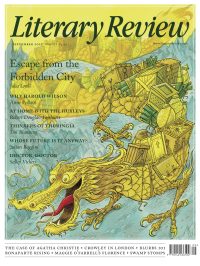Ian Critchley
Notes on a Scandal
Lessons
By Ian McEwan
Jonathan Cape 496pp £20
Towards the end of his 2007 novella On Chesil Beach, Ian McEwan writes, ‘This is how the entire course of a life can be changed – by doing nothing.’ In that story the inaction involves the male protagonist, who fails to go after his new bride as their relationship collapses. But the statement could also apply to the main character of McEwan’s new novel. At the start of Lessons, it is 1986 and Roland Baines is a 37-year-old poet living off benefits. His wife, Alissa, has walked out on him, leaving him to bring up their newborn son, Lawrence. Since departing, she has communicated with him only via postcards and may have returned to her native Germany. Roland finds himself stunned into torpor.
Lessons could rightly be described as ‘epic’, in both its scope and length. By some distance McEwan’s longest novel, it moves from Roland’s 1950s childhood to his old age in the 2020s. As Roland struggles to come to terms with his wife’s departure, he relives his early years in Tripoli (his father, a military man, was posted there) and at a boarding school in Suffolk. The school is on the surface a benign and enlightened place – there is no bullying and one teacher brings up the subject of masturbation, telling the boys, ‘I’ve only two words to say to you ... Enjoy it.’ At the age of eleven, Roland takes piano lessons from a young teacher, Miriam Cornell. Her first action is to tell him his hands are ‘disgusting’, but during one lesson she kisses him on the lips.
The young Roland doesn’t understand this as the assault it clearly is and things get worse when, three years later, consumed by adolescent desire, he visits her and they begin a sexual relationship. Miriam enslaves him mentally and then literally as she moves him into her house and

Sign Up to our newsletter
Receive free articles, highlights from the archive, news, details of prizes, and much more.@Lit_Review
Follow Literary Review on Twitter
Twitter Feed
It wasn’t until 1825 that Pepys’s diary became available for the first time. How it was eventually decrypted and published is a story of subterfuge and duplicity.
Kate Loveman tells the tale.
Kate Loveman - Publishing Pepys
Kate Loveman: Publishing Pepys
literaryreview.co.uk
Arthur Christopher Benson was a pillar of the Edwardian establishment. He was supremely well connected. As his newly published diaries reveal, he was also riotously indiscreet.
Piers Brendon compares Benson’s journals to others from the 20th century.
Piers Brendon - Land of Dopes & Tories
Piers Brendon: Land of Dopes & Tories - The Benson Diaries: Selections from the Diary of Arthur Christopher Benson by Eamon Duffy & Ronald Hyam (edd)
literaryreview.co.uk
Of the siblings Gwen and Augustus John, it is Augustus who has commanded most attention from collectors and connoisseurs.
Was he really the finer artist, asks Tanya Harrod, or is it time Gwen emerged from her brother’s shadow?
Tanya Harrod - Cut from the Same Canvas
Tanya Harrod: Cut from the Same Canvas - Artists, Siblings, Visionaries: The Lives and Loves of Gwen and Augustus John by Judith Mackrell
literaryreview.co.uk